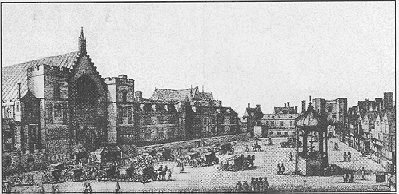Complaints
Hearing
9 November 2000
Mr K.Blain (W56) Rules 6 and 17
Putting his meter on when being offered a non-rejectable job, therefore
trying to fool the computer and then immediately booking back into the
zone.
1 week suspension
Appeals Hearing
17 November 2000
Mr R.Woodford (P49J) Rules 2, 5, 12 and 25
Failing to make adequate arrangements for the return of a client's lost
property.
Original sentence: 2 weeks suspension
Appeals sentence: Severe reprimand
The appeals committee consisted of:
Mr A.Togwell, Mr K.Cain, Mr R.Coy, Mr I.Belkin

Cabs waiting at Westminster Hall in C1654
CALLING A CAB IN THE 18th CENTURY WITH NO DAC!
With grateful thanks to Call Sign's man in Canada, ex-cab driver, now Librarian and expert on taxicab history, Norman Beattie, this article tells how the 18th and 19th centuries version of Dial-a-Cab's account clients managed to call for their cabs...
I know that London's Dial-a-Cab has been going since 1953 when it was
founded by one Bonnie Martyn from the back of his London black taxicab, while
some five years before that, the first experimental radio cab hit London's
still war strewn streets. But in the 18th century, any such trips would have to
have been arranged in advance and presumably would be a regular commute.
The famous London diarist, Samuel Pepys, used to commute daily to
his job in the early 1600's at the Admiralty, although it was by water taxi
rather than hackney coach. In an emergency, Mr Pepys would likely send his
servant trudging across town to make the arrangements.
Post-a-Cab!
Mail was a viable alternative after about 1850. London and other
major cities had two postal deliveries a day, so it was possible to send a
letter in the morning and get a reply in the afternoon!
In nineteenth century London among the middle and upper classes, it was
standard practice to send out a servant to fetch a cab from the nearest taxi
rank. Also, since there were so many cabs cruising illegally, an alternative
method was simply to step outside your door and hail one if you lived on an
even moderately busy street.
In Jerome K. Jerome's 'Three Men in a Boat' (published in the
1880's), the sailors simply piled their luggage on the doorstep and waited for
a cab to come by. Jerome makes a joke of the length of the wait and the amount
of unwelcome attention attracted to them, but the tactic itself was apparently
quite practical.
Of course phones weren't available in the 1700's, but when they
did appear, they spread as rapidly as personal computers did in the 1980's. The
telephone came to my home city of Winnipeg in around 1880 and was quickly
adopted as a means of communication by the local livery stables. The first
phones were on direct lines to hotels, police stations and other popular
venues, but once an exchange was established in 1881, private phones
proliferated. And this was in a dinky little frontier town on the Canadian
prairie!
By 1883, one company had already installed a direct line from the
cab rank to their livery stable, so that cabs could be sent from either
location when a customer called. And so it all started...
But now back in the 21st century, from all of us in Winnipeg to
all of you at London's premier radio taxi organisation, a very merry Christmas
and a very happy new year...
Norman Beattie
Winnipeg, Canada